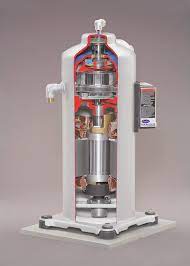Scroll Compressors Benefits and tips and uses

What are scroll compressors?
Scroll compressors are a type of positive-displacement compressors that use two interleaved spiral-like components, called scrolls, to compress and pump gases or liquids. One scroll, called the stationary scroll, remains fixed in place, while the other, called the orbiting scroll, moves in a circular motion around it. As the orbiting scroll moves, it traps and compresses pockets of gas between the two scrolls, delivering compressed gas to the discharge port. Scroll compressor are commonly used in air conditioning, refrigeration, and industrial applications for their smooth and quiet operation, high efficiency, and reliability.
Benefits and drawbacks of using scroll compressors
Benefits of using scroll compressors include:
High Efficiency:
Scroll compressors are designed to provide high compression efficiency, resulting in low energy consumption and reduced operating costs.
Quiet Operation:
Scroll compressors have a smoother operation compared to other types of compressors, making them ideal for use in environments where noise is a concern.
Reliability:
Scroll compressors have fewer moving parts compared to other compressor types, making them more reliable and less prone to breakdowns.
Compact Design:
Scroll compressors are compact in size, making them suitable for use in tight spaces and small equipment.
Low Maintenance:
Scroll compressors have fewer moving parts and require less maintenance compared to other compressor types.
Drawbacks of using scroll compressors include:
Higher Cost:
Scroll compressors are generally more expensive compared to other types of compressors, making them a more costly option for some applications.
Limited Capacity:
Scroll compressors have a limited compression capacity compared to other compressor types, making them less suitable for applications with high volume requirements.
Vulnerability to Contamination: Scroll compressors are vulnerable to contamination, which can damage the compressor or reduce its efficiency.
Specialist Knowledge Required:
Scroll compressors require specialist knowledge and skills for installation, maintenance, and repair, making them less accessible to non-specialist users.
Maintenance tips for scroll compressors
Here are some maintenance tips for scroll compressors:
Regular oil changes:
Regularly changing the oil in the compressor helps to maintain its efficiency and prevent damage to the components.
Clean the air filter:
Regularly cleaning or replacing the air filter helps to keep the compressor running smoothly and prevents the build-up of dirt and debris.
Monitor refrigerant levels:
Regularly checking the refrigerant levels helps to ensure the compressor is functioning properly and prevents damage to the components.
Check for leaks:
Regularly inspecting the system for leaks helps to prevent refrigerant loss and maintain the efficiency of the compressor.
Check for proper alignment:
Checking the alignment of the scrolls helps to ensure proper operation and prevent damage to the components.
Regular inspections:
Regularly inspecting the compressor and its components helps to identify potential issues early on and prevent costly repairs.
Proper storage:
If the compressor is not in use, it should be stored in a clean, dry, and cool place to prevent damage to the components.
Professional maintenance:
Regular professional maintenance is recommended to keep the compressor running smoothly and prevent expensive repairs.
It’s important to follow the manufacturer’s recommendations for maintenance and to only perform maintenance tasks if you are qualified and have the proper tools and equipment.
Comparison between scroll compressors and reciprocating compressors
Here is a comparison between scroll compressors and reciprocating compressors:
Design:
Scroll compressors have a simple, compact design with fewer moving parts compared to reciprocating compressors. Reciprocating compressors have a more complex design with a piston moving back and forth inside a cylinder.
Efficiency:
Scroll compressors are known for their high compression efficiency, making them more energy-efficient than reciprocating compressors.
Noise:
Scroll compressors are known for their quiet operation, while reciprocating compressors can be noisy.
Maintenance:
Scroll compressors require less maintenance compared to reciprocating compressors, which have more moving parts that can wear out over time.
Capacity:
Reciprocating compressors have a higher compression capacity compared to scroll compressors, making them more suitable for high-volume applications.
Cost:
Scroll compressors are generally more expensive compared to reciprocating compressors.
Suitability:
Scroll compressors are suitable for small to medium-sized applications, while reciprocating compressors are suitable for a wider range of applications, including large-scale industrial applications.
In summary, scroll compressors are known for their high efficiency, quiet operation, and low maintenance, while reciprocating compressors are known for their high compression capacity and suitability for large-scale industrial applications. The best choice depends on the specific requirements of the application.
Applications of scroll compressors in various industries
Scroll compressors have a wide range of applications in various industries, including:
HVAC (Heating, Ventilation, and Air Conditioning):
Scroll compressors are commonly used in HVAC systems to compress and circulate refrigerants, helping to regulate temperature and maintain the air quality in buildings.
Refrigeration:
Scroll compressors are used in refrigeration systems to compress and circulate refrigerants, helping to maintain low temperatures in refrigerators, freezers, and other cooling equipment.
Medical Equipment:
Scroll compressors are used in medical equipment, such as oxygen concentrators and anesthesia machines, to compress and circulate gases for breathing and medical purposes.
Food and Beverage Processing:
Scroll compressors are used in food and beverage processing to maintain low temperatures and provide compressed air for food packaging and processing equipment.
Industrial Processes:
Scroll compressors are used in industrial processes, such as petroleum and chemical processing, to compress and circulate gases for process control and operation.
Power Generation:
Scroll compressors are used in power generation to compress and circulate gases for power production, such as in gas turbine power plants.
These are some of the main applications of scroll compressors in various industries. The compact and efficient design of scroll compressors makes them suitable for a wide range of applications where a steady flow of compressed gas is required.
Read also:- Buy Blue Cheese Weed for online sale
Conclusion
In conclusion, scroll compressors are widely used in various industries for their compact, efficient, and reliable design. They work by using two interlocking scrolls that compress and circulate gases, such as refrigerants or air. The benefits of using scroll compressors include their high compression efficiency, quiet operation, and low maintenance requirements. Some of the main applications of scroll compressors include HVAC, refrigeration, medical equipment, food and beverage processing, industrial processes, and power generation. When choosing a compressor, it’s important to consider the specific requirements of the application and compare the features of different types of compressors to find the best solution.





